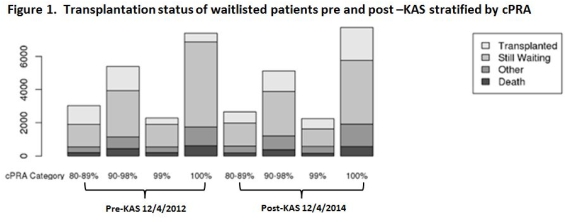Many Highly Sensitized Candidates Still Waiting for Transplant Despite the Kidney Allocation System Change: Making the Case for Incompatible Transplantation
Von Liebig Center for Transplantation and Clinical Regenerative Medicine, Mayo Clinic, Rochester, MN.
Meeting: 2018 American Transplant Congress
Abstract number: B102
Keywords: Allocation, Kidney transplantation, Panel reactive antibodies, Sensitization
Session Information
Session Name: Poster Session B: Kidney Deceased Donor Allocation
Session Type: Poster Session
Date: Sunday, June 3, 2018
Session Time: 6:00pm-7:00pm
 Presentation Time: 6:00pm-7:00pm
Presentation Time: 6:00pm-7:00pm
Location: Hall 4EF
Introduction: The rate of kidney transplantation in highly sensitized individuals has increased since the kidney allocation system (KAS) change, but it remains unclear who has not been transplanted despite allocation priority. The aim of this study was to characterize the highly sensitized patients who remain on the waiting list.
Methods: We compared the transplantation status of cohorts on the UNOS Kidney Transplant Waiting List Pre-KAS (12/4/2012) and Post-KAS (12/4/2014). Each cohort was followed for two years. Patient and kidney transplant characteristics were also analyzed.
Results: Compared to the pre-KAS era, fewer patients with a cPRA 90-98% received a transplant after KAS [24.2% (1240/5126) versus 26.8% (1447/5391), p=<0.0001]. In the 99% cPRA group, the transplantation rate increased from 17% (387/2280) to 27% (612/2241), p<0.001. In the 100% cPRA group, the rate of transplantation increased from 7.1% (526/7402) to 25.6% (1982/7744), p< 0.001 Figure 1. However, active transplant candidates in the 100% cPRA group and followed for 2 years were still 2.2 times as likely to die or remain on the waiting list than receive a transplant in the post-KAS era:7.3% (562/7744) of the candidates died and 49.7% (3847/7744) of the active candidates remain waitlisted. The mean time on dialysis [years (SD)] for patients who remained on the waitlist in the post-KAS period was also higher as the cPRA increased and was 4.4 (3.4) years, 5.1 (4.2) years, 5.6 (4.7) years, and 6.7 (5.1) years respectively in the 80-89%, 90-98%, 99%, and 100% cPRA groups. 
Conclusion: The absolute number of highly sensitized patients on the list remains high two years after KAS implementation despite the increase in the transplantation rate of individuals with cPRA of 99 or 100%. Even with current allocation priority, active transplant candidates with a cPRA of 99 or 100% are more likely to remain waitlisted or die than receive a transplant. These data highlight the need to consider incompatible kidney transplant in select highly sensitized individuals.
CITATION INFORMATION: Schinstock C., Smith B., Bentall A., Stegall M. Many Highly Sensitized Candidates Still Waiting for Transplant Despite the Kidney Allocation System Change: Making the Case for Incompatible Transplantation Am J Transplant. 2017;17 (suppl 3).
To cite this abstract in AMA style:
Schinstock C, Smith B, Bentall A, Stegall M. Many Highly Sensitized Candidates Still Waiting for Transplant Despite the Kidney Allocation System Change: Making the Case for Incompatible Transplantation [abstract]. https://atcmeetingabstracts.com/abstract/many-highly-sensitized-candidates-still-waiting-for-transplant-despite-the-kidney-allocation-system-change-making-the-case-for-incompatible-transplantation/. Accessed February 22, 2026.« Back to 2018 American Transplant Congress
